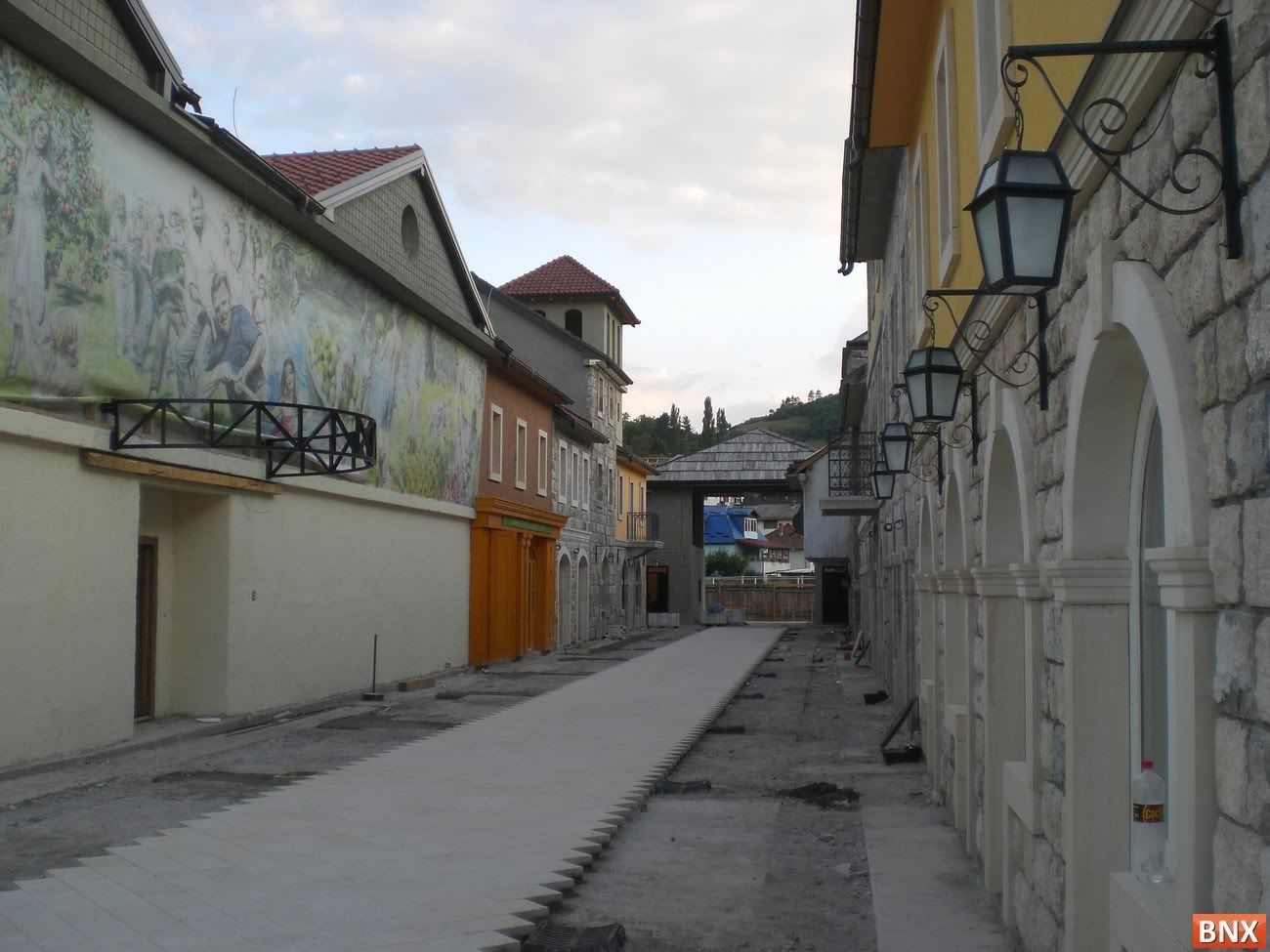|
 
|
Stranica: 2/7.
|
[ 166 post(ov)a ] |
|
| Autor/ica |
Poruka |
|
BBC
|
Naslov: Re: Višegrad  Postano: Postano: 28 ožu 2012, 15:04 |
|
Pridružen/a: 05 lis 2010, 11:48
Postovi: 108302
Lokacija: Županija Herceg-Bosna
|
Gradonačelnik Višegrada. Vidi li tko tu Vartu ? Druga država.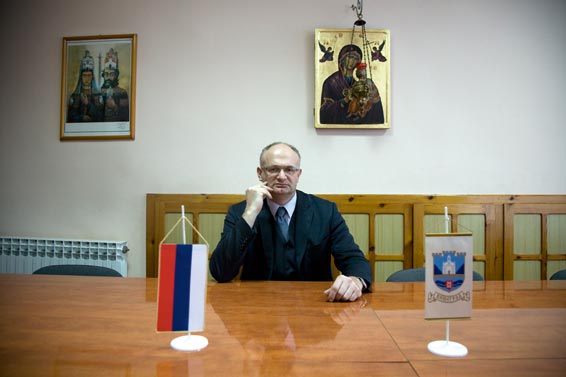
_________________
Spetsnaz, a force for good.
|
|
| Vrh |
|
 |
|
Ministry of Sound
|
Naslov: Re: Višegrad  Postano: Postano: 17 tra 2012, 11:38 |
|
Pridružen/a: 03 svi 2009, 08:25
Postovi: 43715
Lokacija: Folklorni Jugoslaven, praktični Hrvat
|
Velika reportaža iz FT-a o Višegradu. Vrijedi pročitati. Citat: Unforgiven, unforgotten, unresolved: Bosnia 20 years onVisegrad, site of one of the worst atrocities of the Bosnian war, is still in denial about the past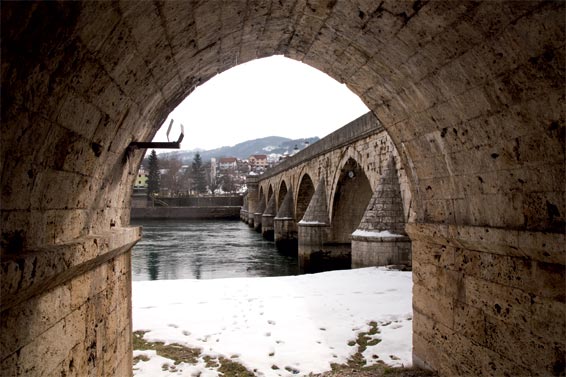 Mayor Tomislav Popovic has a dark three-piece suit, a diffident demeanour and weighs every syllable as if his career depends on it. He reminds me of a small-town Yugoslav bureaucrat from the old days; he even favours the wooden party language of Josip Broz Tito’s era. Only the picture of Prince Lazar, Serbia’s medieval tragic hero, on the wall of his office marks the change of tone in his town since Yugoslavia’s fall. I have come, after all, to the land of Serb nationalist permafrost. Visegrad is in Republika Srpska, the ethnically cleansed enclave carved out by Radovan Karadzic in the 1992-1995 war. When I ask about the picture, the mayor looks a little embarrassed, as he is, understandably, when I ask how Visegrad is confronting its past. “There are no solutions,” he says. “Time has to pass. Where would we start if we got involved in dealing with the past? Would we not have to begin with the Ottoman empire? All truths have to come to the surface and everyone who committed crimes should be prosecuted, but we have to look at everyone equally.” He speaks, carefully, as if by rote. I recall the words of a young Bosnian Muslim lawyer I had spoken to a day before. His family were stalwarts of Visegrad’s Muslim establishment before the war. “Visegrad was worse than Srebrenica,” he had told me. “It was a small, slow genocide that went on for weeks. Teachers murdered pupils. Pupils murdered teachers. Godfathers murdered each other … It was a hunting party and we were the prey.” I have a Bosnian Serb minder in a brown leather jacket, who has co-ordinated my interviews in Visegrad. He sits listening at the far end of the table. The mayor utters more platitudes. Then he moves on to expound his investment plans for the town. I wait to see what, if anything, he will say of my own memories of that terrible Bosnian summer of 1992. I first visited Visegrad with the righteous fury of a young correspondent covering his first civil war. It was August 1992 and Bosnia’s war had been raging for four months. Sarajevo, the capital, was under siege by Bosnian Serb forces. Visegrad was one of a string of towns on the eastern border with Serbia, which they had taken over and “cleansed” of non-Serbs. When I tell Mayor Popovic I had been there all those years ago, he looks momentarily discountenanced. All Bosnians are free to come and go now, he says carefully. He only moved to Visegrad himself nine years ago, long after the end of the war. He turns to the economic downturn and the need for jobs. On the wall facing his desk is an architect’s plan of a half-built theme park for Ivo Andric, the Nobel literature laureate, whose most famous novel, The Bridge on the Drina, is an elegy to the town’s celebrated Ottoman bridge and the tangled relationship of its peoples, Muslims (or Bosniaks as they are now styled) and Serbs. This will, the mayor says, be the salvation of the region, if not of all Bosnian Serbs. Tourists will come in the hundreds of thousands. Investment will pour in, as will hundreds of jobs. “Republika Srpska will provide a brighter future for all.”  Tomislav Popovic, Mayor of Visegrad: ‘ There are no solutions. Time has to pass. Where would we start if we got involved in dealing with the past?’ For half an hour, I indulge his dreams. My minder, all but falls asleep, clearly delighted with the mayor’s line. “We are planning the opening ceremonies,” the mayor says. “They will be the finest marketing for Visegrad you can imagine.” There are, I know, other monuments that have been proposed for Visegrad. But these he does not seem inclined to mention. Ask him about “that house, up the hill in the place that begins with B”, I tell my translator. I do not mention it by name. “What about Bikavac?” he asks. “Should there not be a monument there?” My minder sits up and delivers a volley of quick-fire advice to the mayor. “So far there is no initiative for a monument,” the mayor says carefully. “And I don’t have the information about what happened there … The first thing to do would be to make sure what happened there – that is if it happened.” If it happened ... . . . Bikavac is a hamlet on the fringes of Visegrad, a 15-minute climb from the mighty Drina river, which cuts through the town. It has one of the more dramatic views in the Balkans. In The Bridge on the Drina, Andric describes how on one side of the town the Drina “flows with the whole force of its green and foaming waters from the apparently closed mass of the dark steep mountains”. On the other “like from a spring spreads the whole rolling valley of Visegrad and its surroundings with hamlets nestling in the folds of the hills, covered with meadows, pastures and plum orchards”. Even now, after all that has happened there – and on the bridge in particular – the hills with their pink-roofed farmhouses have an Arcadian feel.  Alec Russell arrived in the Balkans in 1990 aged 24 as a freelance correspondent, and covered the wars in the former Yugoslavia from 1991 to early 1993 for The Daily Telegraph. He then covered the end of white rule in South Africa and Nelson Mandela’s presidency. A former world news editor of the FT, he is now comment and analysis editor Bikavac was a medieval Christian village when Visegrad was just a few huts. By 1992, it had long since become a mixed community, where – as across Visegrad – Muslims and Serbs attended each other’s festivals and shared troubles and joys. In the last census before the Bosnian war, Visegrad’s 21,000 people were 63 per cent Muslim and 33 per cent Serb. Yet, when I first heard the word Bikavac that harmony had ended and Bikavac was Christian again – as it still is now – and the town’s 13,000 Muslims had been either killed or expelled. It was a sweltering morning in August 1992. I was sitting in a hillside plum orchard 10 miles west of the town. All around me was the debris of war: unexploded cluster bomblets, shrapnel-scarred houses and refugees, endless refugees. “Beekavats (as it is pronounced), Beekavats...” shouted the refugees. They stared at their visitors and cursed the negligent west. I had just spent 24 hours in the besieged town of Gorazde, further up the river valley, with Maggie O’Kane, a correspondent for The Guardian, and we were walking back through a tiny pocket of free Bosnian territory seeking to cross the lines to send our dispatches. We had a powerful story to tell of how Gorazde was being suffocated by the Serb siege. The plight of the besieged cities was then dominating the attention of the west. It was only as we listened to the stories of the survivors of Visegrad that we realised the people of Gorazde, facing daily bombardments as they were, were the lucky ones. The refugees spoke of a virtual genocide. From May, Muslims, particularly men, had been rounded up and murdered; as in Rwanda, the educated and wealthy were the first in line. Scores, if not hundreds, were slaughtered on the Ottoman bridge. Hundreds of women were detained and mass raped at the local spa. My most abiding memory is of the face of a slender young Muslim textile worker, Zehra Turjacanin. She was sitting under a tree in the shade. Two older women were waving away the flies hovering over her wounds. Her hands and feet were bandaged. Her face was covered in black scabs. Her ears had all but melted away. It was clear her wounds were badly infected and that she might not live. (Much later, I learnt that it was about then that a doctor suggested to her she should not have precious medicines, as she would not survive. She answered that she had to live.) She spoke in a whisper yet with astonishing force. On the night of June 27, a Serb policeman called Milan Lukic knocked at her door. She had known him from their days at high school. She, her mother, two sisters and four children were bundled into a house down the road with dozens more.  Paul Lowe, the award-winning photographer, covered the conflict in the former Yugoslavia for 10 years from 1989, focusing on the four-year siege of Sarajevo. He is the Course Director of the Master’s in Photojournalism and Documentary Photography at the London College of Communication, and divides his time between London and Sarajevo “When I got to the balcony I saw there was a wardrobe against the front door and all the windows had been blocked with furniture. They started to throw stones at us to make us go inside, then they threw hand grenades. We were the last ones in ... I said to my mother ‘don’t worry they won’t kill us.’ Then they set the house on fire ... I saw a window in the garage door ... I was the only one who got out. “I was wearing trousers, a jumper and a cardigan, and I pulled off my burning clothes. Outside, the Chetniks (Serb nationalists) were standing around watching the house burning. They were drunk and playing music very, very loud, so no one could hear the sound of the burning people screaming inside.” About 70 people were murdered in the Bikavac fire. It was one of the worst single atrocities of the war. It featured prominently in both O’Kane’s and my own dispatches, but even after a year of chronicling Yugoslav atrocities, I was wary about reporting with confidence the accounts of mass executions on the Drina bridge. The refugees talked of people having their throats cut like livestock, with their hands tied behind their backs, and then being hurled into the Drina. But these accounts had the hysterical flavour of wartime propaganda. The bridge had for centuries been a ritual place of atrocity, both in myth and recorded history. For more than a year, the Serbian newspapers had been filling column inches with fictional accounts of Croats stringing children’s fingers as necklaces and such like – and the Croatian media had repaid them in kind. I remember asking myself how could they be confirmed, and suspecting that if we recorded them, we would be deemed to have lost all journalistic perspective. (This was a time when John Major’s government in Britain was desperate to avoid intervention, and officials routinely briefed that correspondents covering Bosnia had lost objectivity and were biased against the Serbs.) Like the hapless western leaders trying to broker meaningless ceasefires, I returned to focus on Sarajevo. After a fruitless visit to Visegrad in search of corroboration, I left Bosnia the following year. For a number of years the story of the slaughter on the bridge remained just that, a story, backed by eye-witnesses but lacking the ultimate proof. Then in 2010, the officials in charge of the hydro-electric dam, downstream of Visegrad, embarked on repair work. To do this they had to drain the reservoir that stretched almost back to the town. For about two months, a 50km-stretch of lake bed was to be laid bare. A small group of Bosniaks – many of them survivors or relatives of the missing – came from Sarajevo with picks and shovels hoping that at long last some answers would emerge. With them was Velija Hasanbegovic, a photographer with a particularly searing memory of Visegrad in the war. 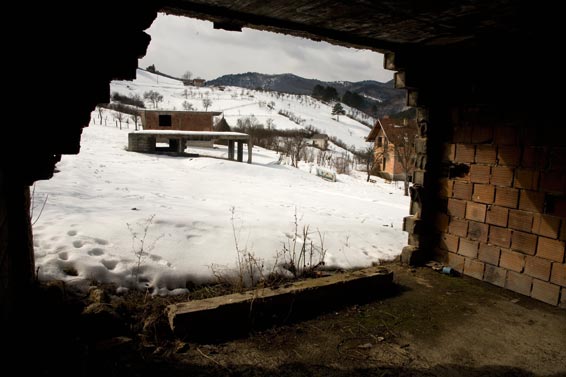 Bikavac is a hamlet on the edge of Visegrad. About 70 people were murdered in the Bikavac fire. It was one of the worst single atrocities of the war ... Now there is nothing to see. Serbs bulldozed the house In his stylish jeans and purple roll neck, Velija is the embodiment of Sarajevo’s sophisticated postwar world. I meet him in a flashy shopping centre. We sit in one of its many packed cafés, next to L’Occitane en Provence and just down from Tommy Hilfiger. The centre is at least a sign of investment since the days of the siege. Velija was 16 when the war came to Visegrad. Until the last moment, it had seemed to him a happy harmonious Yugoslav town. “We (Serbs and Muslims) went to the same school together. We played football and basketball together. Right until the war, we were all Yugoslavs ...” Yet with the wisdom of hindsight, he appreciates Visegrad’s holocaust did not come out of the blue. In 1990, when Bosnia, then one of six republics in the Yugoslav federation, had its first ever multi-party elections the electorate broadly split down ethnic lines. Bosnia was then 43 per cent Muslim, 31 per cent Serb and 17 per cent Croat. Velija’s father was a “true believer” in Yugoslavia. He recalls returning from a meeting of the hardline Serb party and joking to his father: “Your time is over. Democracy is on its way. My father said: ‘My son you’ll see what is coming.’ Unfortunately he was right.” ..............................
_________________
sklon'se bona Zineta sa penđera, vidiš da te vlasi oćima kurišu

|
|
| Vrh |
|
 |
|
Ministry of Sound
|
Naslov: Re: Višegrad  Postano: Postano: 17 tra 2012, 11:42 |
|
Pridružen/a: 03 svi 2009, 08:25
Postovi: 43715
Lokacija: Folklorni Jugoslaven, praktični Hrvat
|
Citat: The touchpaper in Visegrad, as in towns across Bosnia, was lit by a referendum on independence in March 1992, an event sparked by the rush to independence of its fellow Yugoslav republics Slovenia and Croatia the previous year. The vote was boycotted by most Bosnian Serbs, fired up by the nationalist propaganda of their party leader, the bouffant-haired psychiatrist Karadzic, but also fearful of life as a minority in an independent state. Early the next month, as part of a co-ordinated move across Bosnia, Serb paramilitaries started shelling from the hills. Aided by the Serb-dominated Yugoslav army, they had long stockpiled arms. Visegrad, on the border with Serbia, was a prime target to be secured. After three or four days of fighting, the Muslims fled up the river valley to Gorazde. Then the Yugoslav army took over Visegrad and said everyone was safe to return. “My father decided we would go back. He said we haven’t done anything. My parents talked it over but thought nothing would happen.” And so they went back and entered the seventh circle of hell. The only time Velija’s speech falters is when recalling those days. “They started to take Muslim men in for ‘conversations’ but they never returned. Then on June 17 our Serb neighbour called at about 3pm. He said: ‘Don’t worry.’ Fifteen minutes later Serb soldiers came to our house ... ” Velija recognised one of them from before the war. They ordered him and his brother and father to go with them and were driven to Vilina Vlas, the spa a few miles out of town. There the soldiers collected their superior. Velija’s father knew him and tried in vain to plead their case. On the way back to Visegrad the soldiers stopped beside the Drina and ordered them out. “My father said this is where they will kill us ... We knew this was the end ... ” Velija reaches for my interpreter’s iPad and fiddles on Google Maps to pinpoint the spot. “We were just by the water when we heard shots. I saw I was not wounded and looked round surprised. Then I heard more shots and the soldiers running away ... We threw ourselves into the river and swam ... ” The following day, in the relative safety of a Bosniak village, they understood their good fortune. On the other side of the river two or three Muslims with rifles had seen their plight and opened fire. It was one of the first cases of Muslims in the region fighting back. Velija turns to the iPad again and calls up a series of black and white photographs. We look at them in silence. They chronicle the exhumation of the Visegrad reservoir bed in the late summer of 2010. It was just one of the many investigations seeking to find traces of the 30,000 people who disappeared during the war, a third of whom are still missing. But in this case the time frame was particularly tight. For just two months the ground was uncovered. In one of the pictures, a forest of white flags flutters across the reservoir bed. Each marks where a skeleton was found. To date 162 sets of remains have been identified by DNA, 40 were women, a quarter were under the age of 16, two were Bosnian Serb soldiers. About 40 more sets of remains are unidentified. Of the main imam when the war started just three bones were found. “It should have been me,” says Velija. “It should have been me. Maybe if society goes through cleansing and faces up to our history and crimes, there is a hope a future generation can have a better society. But while there is denial ... it is impossible.” . . . To a casual visitor, Visegrad looks like any other sleepy town in the southern Balkans. The mosques, destroyed by the Serbs, have been rebuilt. As the years have passed a handful of Muslims have returned, as enshrined in the mosaic of international laws governing Bosnia’s postwar course. But most return only to try to sell their old homes. In Visegrad, the past is unforgiven, unforgotten, unresolved. The town is as it was at the end of the war. The truth is that the Dayton accords of 1995 enshrined a ceasefire, but did not pave the way for reunification. They created the ultimate decentralised state, with two entities, the Federation of Bosnia and Herzegovina and Republika Srpska, 10 cantons in the federation and strong municipal governments. Now the clear plan of Karadzic’s successors is to play the long game and hope the west will get tired of babysitting Bosnia and, ultimately, accept they are a separate state. 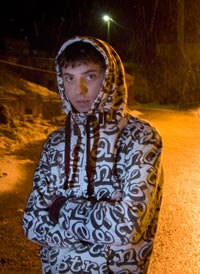 Edin Duran, Bosniak student: ‘People said: "You Turk, what are you doing with us Serbs?”’ Duran is the only Bosniak at the high school Edin Duran is the only Bosniak at the high school. He commutes each day the 10 miles from his village, which is where I took shelter on my way through in 1992. It was difficult at first at school, he says. “People said: ‘You Turk, what are you doing with us Serbs?’ But now, I don’t have any problems with them. I even hang out with them at night.” His account is a reminder of how the passing of the years will help. But his story is an exception. When Bosniak widows put wreaths on the bridge two years ago, the flowers were thrown in the Drina. When a convicted Serb war criminal returned home in March 2010 after serving two-thirds of a 15-year Hague sentence, he met a hero’s welcome. I sit down with an 85-year-old who lived in Visegrad throughout the war. He insists he tried to help Muslims – as some Serbs unquestionably did. Then he lurches into a bilious claim that the Muslims had had hit lists of the Serbs they wanted to kill. When I say that surely it was the other way round, he plays his trump card. He points to a picture of a young man behind me: his son who was killed in the war. Primarily, of course, the culture of denial reflects guilt: at least 2,000 Muslims were massacred there between May and July 1992. But the region’s ritual selective sifting of history, too, reinforces the code. In the early 1990s, it was infuriating to hear western leaders invoke supposed ancestral ethnic hatreds as a reason to justify their decision not to intervene – early in his presidency, Bill Clinton was famously influenced against involvement by the book Balkan Ghosts, by Robert Kaplan, to the author’s subsequent frustration. The Serbs did indeed like to cite history, but the war in Bosnia was fundamentally a simple affair: it was a grab for land. In most eastern Bosnian towns such as Visegrad, the Muslims did not have a chance. Yet in the mind of many Serbs, theirs was a pre-emptive strike, aimed at fending off a rerun of servitude past. Under the Ottoman empire they had underdog status: Muslims tended to prosper, while many Serbs were serfs. They feared a Muslim-led Bosnia and treasured the idea of a “Greater Serbia”, as espoused by Slobodan Milosevic, the president of Serbia and his then ally, Karadzic. Then again, of course, some Serbs were innocents easily whipped up by propaganda to hate and fear their old neighbours. 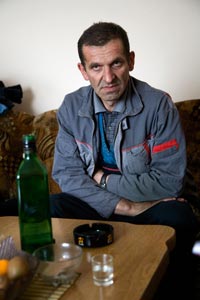 Ljubisa Simeunovic, labourer: ‘ The Muslims have won the media war. What about that little Muslim girl who was seven months old? A Serb soldier saved her at Srebrenica’ Ljubisa Simeunovic, a 49-year-old labourer, is very much in this camp. I meet him in a timber yard on the edge of Visegrad. He is tall and nervy and wearing tatty blue overalls. He relies heavily on my minder, for answers. With traditional Balkan hospitality he invites me home. Over the inevitable shot of plum brandy, he tells of his family’s brush with death at the hands of a Bosniak band. On August 1 1992, a month after the town’s “cleansing” was complete, his Serb-only village was targeted for revenge. Ten people were killed, he says. It was the style of raid that the besieged residents of Srebrenica, down the Drina valley, were to pull off many times before General Ratko Mladic’s forces exacted their infamous revenge. “I found one guy who used to cut our grass sitting in front of his house with his bags packed and coffee at his side,” he says. “He didn’t even get a chance to drink it. He was dead. My wife and children spent the night in the forest. My older son was four and a half years old.” So was this not a relatively small reprisal given the atrocities in the town? He seems unsure how to respond. “The Muslims have won the media war,” he says. “What about that little Muslim girl who was seven months old? A Serb soldier saved her at Srebrenica. She grew up in Belgrade. Yet when she went back to Bosnia she wanted to tell her story ... but they did not want to hear.” My minder interjects that there are people whose names are on the Srebrenica memorial plate who are still alive. And the massacre at Bikavac? “Regular people think the guy convicted [who was given the hero’s welcome] was innocent, he was just a drunkard. If you pull anyone off the street, they would say he was innocent.” One of the reasons the Bosnian Serbs feel so defensive is that they believe no one acknowledges their own losses. As the war ground on, their forces incurred increasing casualties. They lost up to 20,000 soldiers in the war. There were cases, such as in this village, where their civilians were massacred. However, the overwhelming majority of massacres were committed by the Serbs, a difficult truth to acknowledge, hence the need to obfuscate and deny. One Bosnian Serb certainly not ready to concede an argument is 50-year-old Preendija Drazan. He runs a small business in Visegrad now, but his shaven head, bull-neck and chest mark him out indelibly as an ex-military man. He fought under Mladic, now charged with genocide at the Hague war crimes tribunal, over the massacre of 8,000 men and boys at Srebrenica. He served the entire war in the villages around Visegrad and Gorazde where after the initial capture of swathes of territory, the Serbs’ offensive stalled. On one day in 1992, he lost 12 of his men. Some of his most fierce fighting was around the village where I had met the terribly burned Zehra. When I ask about the Hague war crimes tribunal, he bristles. It had been biased against the Serbs. And Mladic? A look of pride crosses his face and for a moment, I think he is about to spring to attention. “Mladic is my favourite commander, my role model. He never gave the order to kill anyone that is weak, regardless of the fact that they tried to pin a lot on his name.” I raise my eyebrows. “If I could turn the clock back, it would be a huge honour to be under his command again.” As for Srebrenica, he cites the Serbian casualties in three years of fighting in the region, as somehow a justification for the subsequent massacre. “How would a professional British army have behaved if they entered a city such as Srebrenica in which 3,400 Britons had been killed? I don’t believe they would behave democratically.” 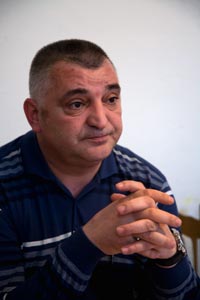 Preendija Drazan, business owner: ‘Mladic is my favourite commander, my role model. He never gave the order to kill anyone that is weak’ His approach reminds me of the war when I lost count of the number of Serbs who invoked hazy memories of British co-operation with the Serb-dominated partisans in the second world war. It was an approach that worked well with many officers with the UN and Nato, particularly Britons. To their shame many openly found it easier to work with the Serbs: they, after all, looked like a proper army, unlike the ragtag Muslim troops. Drazan dwells at length on the second world war, but his main contention is that the atrocities were exaggerated and their context missed. He left his flat in Sarajevo in April 1992 and hasn’t been back since. He would not be welcome, he says. He would not return for 10m Bosnian marks (£4m). As for the countdown to the war in Visegrad, Serbs feared for their future. He cites a series of incidents from 1990-92, such as a young Serb being killed, pilgrims being barracked by young Muslims and the desecration of a statue of Andric. There is no doubt that the young Serb was killed, although whether in a row over business or a love affair we may never know. Yet such incidents pale into insignificance against the orchestrated cataclysm that followed. When I suggest that surely the Serbs of Visegrad should at the very least say sorry, his eyes gleam. In the second world war he lost aunts and uncles. “We were the ones massacred. The Muslims should say sorry first.” But the numbers were different this time, I say, weren’t they? “Maybe it was time that the numbers were the other way round ... ” . . . Three hours winding drive away in Sarajevo, Hejida Kasapovic has dedicated her life to Visegrad’s battle over memory. A tall, striking woman with mournful eyes, she heads an association for survivors and was among those digging in the lake for remains. Her two brothers were killed in Visegrad, one in front of their father. Her sister-in-law was repeatedly raped at the spa. I meet her in a café in the Hotel Europe. The tables are full of gossiping Sarajevans drinking coffee, and foreign trade delegations. The days when the only guests were aid workers and soldiers are long gone. The scene encapsulates the steps that Bosnia has taken in two decades. Tourists are starting to return to Sarajevo. Its annual film festival gains prestige by the year. EU diplomats are even hoping to nudge Bosnia down the track towards accession – although Croatia certainly and Serbia probably will get there first, a bitter irony for Bosniaks given Zagreb’s and Belgrade’s connivance in their homeland’s dismemberment in the war. But Brussels’ aspirations cloak the reality that Bosnia is as sundered as after Dayton.The Croat-dominated part of the federation, which tried in the war to secede, is on the ground all but as separate as Republika Srpska. This is against the backdrop of 43 per cent unemployment and a still ravaged economy which is dependent on remittances. Lord Ashdown, the British politician who was high representative for Bosnia – the 21st century equivalent of proconsul or colonial governor – between 2002 and 2006 worries that in the past few years Bosnia has started slipping backwards. He thinks nationalism is on the rise, that early progress towards creating a “light-touch” central state, such as the creation of a central judiciary, has stalled, and that Brussels has given up on trying to forge a united country. “The policy of the international community in the past few years has been utterly disastrous,” he says. “Europe absentmindedly finds itself being the instrument for the realisation of the plans of Karadzic. And if you let the Serbs get away with returning to the past, the Bosniaks will start to do the same, and so will the Croats.” In his view, the war generation has to have handed over power if not died before Bosnia has a chance of addressing its past. Delving into a disputed past is always difficult. Yet Bosnia has to, if it is ever to be a functioning state. As a correspondent I covered South Africa’s Truth and Reconciliation Commission, the body set up to unearth and then exorcise a divided past. Its mandate was to expose and in return for confessions forgive human rights abuses. Even with the agreement of the former and new rulers, it was bitterly contested by supporters of both sides but South Africa is at least closer to an uncontested truth about what happened under apartheid. In Bosnia, there has been no such agreement. There was a peace deal but no more. So it is impossible to imagine scenes such as in Germany in 1945, when Germans who had lived near concentration camps were made to file through them to appreciate the enormity of what had occurred. 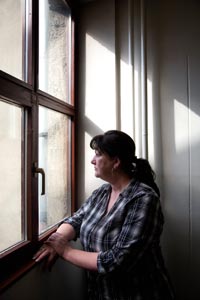 Hejida Kasapovic, head of an association for the war’s survivors: ‘ I cannot forgive and I cannot forget. I am not putting blame on all Serbs. Some didn’t want to participate. But no one has ever apologised. Not one person’ Chain-smoking, and with tears in her eyes, Kasapovic says neither truth nor reconciliation are possible. The remains of her younger brother were found a few years ago. “I cannot forgive and I cannot forget. I am not putting blame on all Serbs. Some didn’t want to participate but had to or they would have been killed. But no one has ever apologised. Not one person.” On the other side of Sarajevo, I meet a man I last saw 20 years ago at the start of the siege. Ejup Ganic was Bosnia’s deputy president in the war. I first encountered him in the Austro-Hungarian offices of the presidency that looked out over the front line. Except for his silvery hair, he looks little changed. His exasperation with the west is undimmed. He thinks the west should have initially given the Republika Srpska leaders an ultimatum that unless they welcomed back say 50 per cent of the refugees in five years, their “entity” would be abolished. “The west may have picked up Karadzic and Mladic but it is not touching the institutions they left behind, and these continue to do the same job. When Clinton signed Dayton, was it in the belief that the world had to accept ethnic cleansing? You should not leave scissors in the stomach of a patient, so to speak.” Zehra, the one survivor of Bikavac, has at least lived to justify her decision to demand those much-needed medicines: she had her day in court. After Dayton, Milan Lukic clearly thought he had impunity, and branched out into organised crime. But when Milosevic, the godfather of Serbdom, was overthrown in 2000 the regional wheels of justice at long last started to grind. Lukic fled to South America, and in 2005, was extradited from Argentina to The Hague. Four years later he was sentenced to life imprisonment. It was Zehra’s evidence that helped to convict him. She is now living in France and refuses to speak her native language. “I am alive,” she told the court. “Life is beautiful and I want to live it to the full.” Yet most of the guilty are unpunished. The man who oversaw the attempted execution of the photographer is thought to be hiding in Serbia. Staff at the spa, which served as a rape camp, serve meals as before. At Bikavac there is nothing to see. Serbs have bulldozed the house. The municipality has blocked attempts to build a memorial. Only an Islamic cemetery nearby testifies to the old way of life. Bikavac, said Judge Patrick Robinson, president of the Hague tribunal, ranks high in the “long, sad and wretched history of man’s inhumanity to man.” But in Visegrad it is as if nothing ever happened.
_________________
sklon'se bona Zineta sa penđera, vidiš da te vlasi oćima kurišu

|
|
| Vrh |
|
 |
|
Ministry of Sound
|
Naslov: Re: Višegrad  Postano: Postano: 17 tra 2012, 11:44 |
|
Pridružen/a: 03 svi 2009, 08:25
Postovi: 43715
Lokacija: Folklorni Jugoslaven, praktični Hrvat
|
Citat: What happened in Visegrad?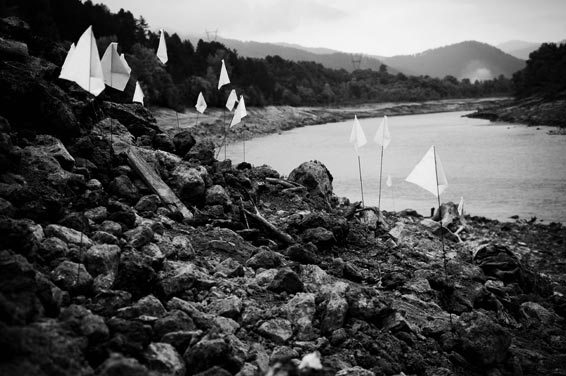 Each white flag marks the spot where a skeleton was found In 1992, Muslim refugees claimed that scores, if not hundreds, of Muslims had been murdered on the bridge in Visegrad, their bodies thrown into the river. In 2010, a small group of relatives and friends of the missing returned, hoping to find answers. When a reservoir downstream was drained during repair work, those digging for evidence found about 200 sets of human remains.  From left: Digging up the reservoir bed and excavators carefully sift through the soil and debris to find human remains 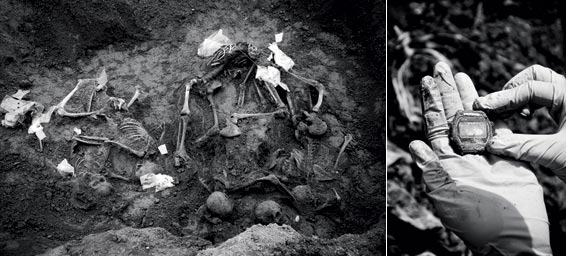 From left: A mass grave – to date 162 sets of remains have been identified by DNA, another 40 are still unknown and a watch retrieved from the site These photographs documenting the exhumation of the Visegrad reservoir bed were taken by Velija Hasanbegovic, a photographer who himself, at the age of 16, escaped Serb paramilitaries in Visegrad. 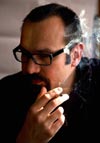 Alec Russell is the FT’s comment and analysis editor
_________________
sklon'se bona Zineta sa penđera, vidiš da te vlasi oćima kurišu

|
|
| Vrh |
|
 |
|
BBC
|
Naslov: Re: Višegrad  Postano: Postano: 29 tra 2012, 21:28 |
|
Pridružen/a: 05 lis 2010, 11:48
Postovi: 108302
Lokacija: Županija Herceg-Bosna
|
|
Zašto su Bošnjaci srušili bistu Andrića ? Što im to smetalo. Nije osunećen bio ?
_________________
Spetsnaz, a force for good.
|
|
| Vrh |
|
 |
|
Jagnjeca brigada
|
Naslov: Re: Višegrad  Postano: Postano: 29 tra 2012, 23:09 |
|
Pridružen/a: 11 vel 2012, 12:30
Postovi: 12878
|
|
Tadić, Dodik i Kusturica u Višegradu - Andrićgradu.
[youtube]http://www.youtube.com/watch?feature=player_embedded&v=Ol5CC-abSgA[/youtube]
|
|
| Vrh |
|
 |
|
teranova
|
Naslov: Re: Višegrad  Postano: Postano: 29 tra 2012, 23:12 |
|
Pridružen/a: 02 lip 2009, 00:05
Postovi: 13227
|
BBC je napisao/la: Zašto su Bošnjaci srušili bistu Andrića ? Što im to smetalo. Nije osunećen bio ? Samo je pisao o mržnji, to jest istinu.
|
|
| Vrh |
|
 |
|
Bobovac
|
Naslov: Re: Višegrad  Postano: Postano: 30 tra 2012, 07:53 |
|
Pridružen/a: 24 ruj 2009, 10:09
Postovi: 28338
Lokacija: Heartbreak Hotel
|
BBC je napisao/la: Zašto su Bošnjaci srušili bistu Andrića ? Što im to smetalo. Nije osunećen bio ? Bistu Ive Andrića je prije rata srušio osobno Murat Šabanović, poznat po tv duelu sa generalom Kukanjcem i epizodom - prijetnja rušenjem brane na hidrocentrali kod Višegrada. A evo što je sam rekao zašto je to učinio: Hrvatska riječ: Recite nam zašto ste srušili bistu Ive Andrića?- I to bih opet tako napravio, ali ne bih bistu bacio u Drinu. Andriću kao nobelovcu i književniku treba se napraviti spomenik, ali na mjestu gdje je ukopan. Pošto znamo da je kremiran u Beogradu, to treba uraditi tamo. Ako je zadužio Višegrad svojom knjigom, onda mu spomenik treba postaviti negdje u biblioteci. Iz revolta što su postavili spomenik na grobnicu muslimanskog naroda i Mosta Mehmed-paše Sokolovića to sam učinio.
Dakle, zbog zaštite nečega što je starije od Ive više od pet puta. Uzeo sam macolu, odvalio mu glavu, bacio je u Drinu i rekao sam: “Gospodo, to je moj gest protiv toga što radite što ne treba”. Ako se ikada vratim u Višegrad, ponovo ću srušiti bistu Ive Andrića, jer mu nije mjesto na zadužbini Mehmed-paše Sokolovića. Razgovarao sam s akademikom Abdulahom Sidranom, koji me je upitao zašto sam to uradio s bistom Andrića, i rekao sam mu: “Ne, zbog njegovih književničkih zasluga, nego zbog inata što je postavljen spomenik na spomeniku”.http://www.hrvatska-rijec.com/2012/03/m ... -visegrad/
_________________
"Uzalud vam sav tisak i sve radio postaje, našim srcima nikad nećete ovladati", nadbiskup Alojzije Stepinac, Zagreb, 1942.
|
|
| Vrh |
|
 |
|
Lebowski
|
Naslov: Re: Višegrad  Postano: Postano: 30 tra 2012, 08:26 |
|
Pridružen/a: 13 sij 2012, 16:01
Postovi: 12304
|
|
Sad će kad se vrati srušit čitav grad.
|
|
| Vrh |
|
 |
|
Jagnjeca brigada
|
Naslov: Re: Višegrad  Postano: Postano: 30 tra 2012, 09:40 |
|
Pridružen/a: 11 vel 2012, 12:30
Postovi: 12878
|
|
| Vrh |
|
 |
|
VUKsaJUGA
|
Naslov: Re: Višegrad  Postano: Postano: 30 tra 2012, 09:53 |
|
Pridružen/a: 16 ožu 2010, 21:38
Postovi: 4563
|
|
MA on kad je bacuio Andricevu "glavu" u Drinu nije ni znao ko je Ivo Andric.
|
|
| Vrh |
|
 |
|
Jagnjeca brigada
|
Naslov: Re: Višegrad  Postano: Postano: 30 tra 2012, 11:25 |
|
Pridružen/a: 11 vel 2012, 12:30
Postovi: 12878
|
|
A verovatno je u u "Mehmed paša Sokolović" čuo samo "Mehmed paša".
|
|
| Vrh |
|
 |
|
Melcher
|
Naslov: Re: Višegrad  Postano: Postano: 30 tra 2012, 17:07 |
|
Pridružen/a: 16 vel 2012, 14:37
Postovi: 952
Lokacija: AID Headquarters
|
LOL. I bacanje te biste u Drinu Srbima je bila dovoljna "provokacija" da ucine ono sto su ucinili vecinskom bosnjackom stanovnistvu tadasnjeg Visegrada i visegradske opcine. Ne razumijem, zasto su se Srbi toliko "zestoko" usprotivili zbog bacanja jednog Hrvata u Drinu?! 
_________________
Bismillah ir rahmani rahim, rabbi yessir, velatuassir, rabbi temim, bil hajr - Amin!
|
|
| Vrh |
|
 |
|
mario_cro
|
Naslov: Re: Višegrad  Postano: Postano: 30 tra 2012, 17:11 |
|
Pridružen/a: 02 lip 2011, 12:01
Postovi: 3675
Lokacija: Edmonton,Alberta,Canada
|
Melcher je napisao/la: LOL. I bacanje te biste u Drinu Srbima je bila dovoljna "provokacija" da ucine ono sto su ucinili vecinskom bosnjackom stanovnistvu tadasnjeg Visegrada i visegradske opcine. Ne razumijem, zasto su se Srbi toliko "zestoko" usprotivili zbog bacanja jednog Hrvata u Drinu?!  Pa zato što ga Srbi smatraju Srbinom.
_________________
"Nisu svi koji lutaju izgubljeni"
|
|
| Vrh |
|
 |
|
Melcher
|
Naslov: Re: Višegrad  Postano: Postano: 01 svi 2012, 16:28 |
|
Pridružen/a: 16 vel 2012, 14:37
Postovi: 952
Lokacija: AID Headquarters
|
mario_cro je napisao/la: Melcher je napisao/la: LOL. I bacanje te biste u Drinu Srbima je bila dovoljna "provokacija" da ucine ono sto su ucinili vecinskom bosnjackom stanovnistvu tadasnjeg Visegrada i visegradske opcine. Ne razumijem, zasto su se Srbi toliko "zestoko" usprotivili zbog bacanja jednog Hrvata u Drinu?!  Pa zato što ga Srbi smatraju Srbinom. Bas kao i Rudera Boskovica, Gundulica i svakog covjeka koji je spomena vrijedan. Ostali su turski shljam i becki konjushari.
_________________
Bismillah ir rahmani rahim, rabbi yessir, velatuassir, rabbi temim, bil hajr - Amin!
|
|
| Vrh |
|
 |
|
osa
|
Naslov: Re: Višegrad  Postano: Postano: 01 svi 2012, 21:52 |
|
Pridružen/a: 27 svi 2009, 13:12
Postovi: 5619
Lokacija: sisak
|
Melcher je napisao/la: mario_cro je napisao/la:
Pa zato što ga Srbi smatraju Srbinom.
Bas kao i Rudera Boskovica, Gundulica i svakog covjeka koji je spomena vrijedan. Ostali su turski shljam i becki konjushari. da dodam i hrvoja vukčića hrvatinića, srpskog velikaša iz srednjevjekovne bosne...
_________________
Ne postoje vječni prijatelji i vječni neprijatelji!
|
|
| Vrh |
|
 |
|
Jagnjeca brigada
|
Naslov: Re: Višegrad  Postano: Postano: 26 svi 2012, 18:20 |
|
Pridružen/a: 11 vel 2012, 12:30
Postovi: 12878
|
Citat: Sahranjeno 66 žrtava iz jezera Perućac
FoNet, Beta | 26. 05. 2012. - 17:26h 18:37h | Foto: AFP | Komentara: 22
Nekoliko hiljada ljudi okupilo se danas na groblju Stratište u Višegradu, na sahrani posmrtnih ostataka 66 Muslimana koje su snage bosanskih Srba ubile i bacile u Drinu 1992. godine.
Najstarija žrtva je Hasida Ohranović koja je ubijena u 86. godini, a najmlađe su deca stara četiri i šest godina.
Danas je u reku Drinu bačeno 3.000 ruža, od toga 130 belih, koliko je ubijeno maloletne dece u Višegradu. Nakon ukopa, otkriveno je spomen-obeležje žrtvama, i na taj način je obeležena 20. godišnjica od zločina počinjenih nad Bošnjacima u Višegradu koji su počinjeni tokom rata u Bosni i Hercegovini od 1992. do 1995. godine.
Zajedničkoj sahrani prisustvovalo je oko 5.000 građana iz cele BiH. Posmrtni ostaci žrtava otkriveni su pre dve godine, kada je delimično ispražnjeno jezero Perućac, radi popravke brane. Identitet žrtava je utvrđen DNK analizom.
Na području Višegrada su srpske snage ubile nekoliko hiljada civila i njihova tela bacile u Drinu ili ih sahranile u masovnim grobnicama. Neka počivaju u miru.
|
|
| Vrh |
|
 |
|
zapovjednik
|
Naslov: Re: Višegrad  Postano: Postano: 27 lip 2012, 15:34 |
|
Pridružen/a: 27 kol 2010, 07:22
Postovi: 4632
|
|
| Vrh |
|
 |
|
SarajkaDjevojka
|
Naslov: Re: Višegrad  Postano: Postano: 06 kol 2012, 23:27 |
|
Pridružen/a: 28 srp 2012, 23:08
Postovi: 22099
Lokacija: među zvijezdama
|
_________________
Sarajevo ljubavi moja! Слава Україні!
Ponesi zastavu!!!!
|
|
| Vrh |
|
 |
|
SarajkaDjevojka
|
Naslov: Re: Višegrad  Postano: Postano: 07 kol 2012, 11:51 |
|
Pridružen/a: 28 srp 2012, 23:08
Postovi: 22099
Lokacija: među zvijezdama
|
|
Obilježena 20. godišnjica stradanja Bošnjaka u Višegradu
Written by AGENCIJA ANADOLIJA Elvir Hodžić/ Samir Jordamović
font size Štampa E-mail
Image Gallery
Rate this item1 2 3 4 5 (0 votes)
Desetine članova porodica višegradskih žrtava i njihovi prijatelji okupili su se na mjestu stradanja Bošnjaka koji se desio na današnji dan prije 20 godina u Pionirskoj ulici u Višegradu. Srpske snage su 14. juna 1992. zarobile, a potom na živoj lomači zapalile 70 bošnjačke djece, žena, starih i iznemoglih osoba.
Stravičan prizor ruševne kuće Adema Omeragića, u kojoj se zločin desio, i uplakana lica porodica spaljenih Bošnjaka, prizivali su jezive zvuke i slike lomače u kojoj je izgorjela i beba rođena dva dana ranije. Najstarija spaljena žrtva je imala 79 godina.
Predsjednik Skupštine opštine Višegrad i predsjednik Islamske zajednice u ovom gradu, Bilal Memišević, kazao je novinarima agencije Anadolija da je nakon velikih napora Islamske zajednice i udruženja Žena žrtva rata, koji su prije dvije i pol godine podnijeli zahtjev za izgradnju spomen obilježja na mjestu kuće Adema Omeragića, sva ta borba urodila plodom i da će „u drugoj polovini ove godine početi radovi na rekonstrukciji ovog objekta, koji će služiti kao mjesto opomene i otvoriti nove vidike Višegradu i višegradskim Bošnjacima“.
„Ne smijemo zaboraviti ovaj zločin. Poznata je tvrdnja da oni koji imaju kratko pamćenje imaju kratku i neizvjesnu budućnost“, poručio je Memišević.
AGENCIJA ANADOLIJA - FOTO I TEKST
Elvir Hodžić/ Samir Jordamović
Last modified on četvrtak, 14 jun 2012 15:31
_________________
Sarajevo ljubavi moja! Слава Україні!
Ponesi zastavu!!!!
|
|
| Vrh |
|
 |
|
Jagnjeca brigada
|
Naslov: Re: Višegrad  Postano: Postano: 09 kol 2012, 01:25 |
|
Pridružen/a: 11 vel 2012, 12:30
Postovi: 12878
|
|
| Vrh |
|
 |
|
Pessimus dux
|
Naslov: Re: Višegrad  Postano: Postano: 09 kol 2012, 13:16 |
|
Pridružen/a: 01 lip 2009, 17:27
Postovi: 5937
Lokacija: Generalni konzulat HR HB za Slavoniju i Baranju
|
Jebote, na ovim slikama izgleda kao neki mediteranski grad, a la Dubrovnik/Kotor... 
|
|
| Vrh |
|
 |
|
Zadar1993
|
Naslov: Re: Višegrad  Postano: Postano: 09 kol 2012, 13:21 |
|
Pridružen/a: 21 kol 2011, 15:34
Postovi: 15238
Lokacija: Misao svijeta
|
Pessimus dux je napisao/la: Jebote, na ovim slikama izgleda kao neki mediteranski grad, a la Dubrovnik/Kotor...  Zbog toga mi se i svidio projekt Andrićgrad. Vraća Višegrad njegovim pred-osmanskim korijenima u jednu ruku.
_________________
Te kad mi jednom s dušom po svemiru se krene,
Zaorit ću ko grom:
O, gledajte ju divnu, vi zvijezde udivljene,
To moj je, moj je dom!
|
|
| Vrh |
|
 |
|
Jagnjeca brigada
|
Naslov: Re: Višegrad  Postano: Postano: 09 kol 2012, 13:28 |
|
Pridružen/a: 11 vel 2012, 12:30
Postovi: 12878
|
|
Koliko sam video mesto je kombinacija tog mediteranskog stila, sa osmanskim, srpskim srednjevekovnim i nešto klasike-renesanse. Možda malo kič, ali za sada pristojno izvedeno. Izgleda nekako živo...
E sad što smo mi navikli da srednjovekovna istorija ovih prostora bude očuvana u samo tri varijante:
a) kameni mediteranski gradić
b) koliba u vukojebini
c) ruševno utvrđenje
To možemo zahvaliti ovima što su doneli "kulturu" i "toleranciju" na ove prostore... tamo negde iz Azije.
|
|
| Vrh |
|
 |
|
Jagnjeca brigada
|
Naslov: Re: Višegrad  Postano: Postano: 09 kol 2012, 13:40 |
|
Pridružen/a: 11 vel 2012, 12:30
Postovi: 12878
|
   U svakom slučaju, u tom Andrićgradu će biti crkva, trg, festival, obrazovna institucija, sedište uprave grada, pijaca, kafići, zanatske radnje, kafane, zgradu HE itd. Pravi centar jednog grada. Uz to postoji ćuprija, banja, manastir Dobrun... Solidna turistička ponuda. Ako nekad konačno i naprave autoput BGD-Jadran, biće prilike da kroz Višegrad prođe njegova veza sa Sarajevom npr.
|
|
| Vrh |
|
 |
Online |
Trenutno korisnika/ca: / i 0 gostiju. |
|
Ne možeš započinjati nove teme.
Ne možeš odgovarati na postove.
Ne možeš uređivati svoje postove.
Ne možeš izbrisati svoje postove.
Ne možeš postati privitke.
|
|
|

















